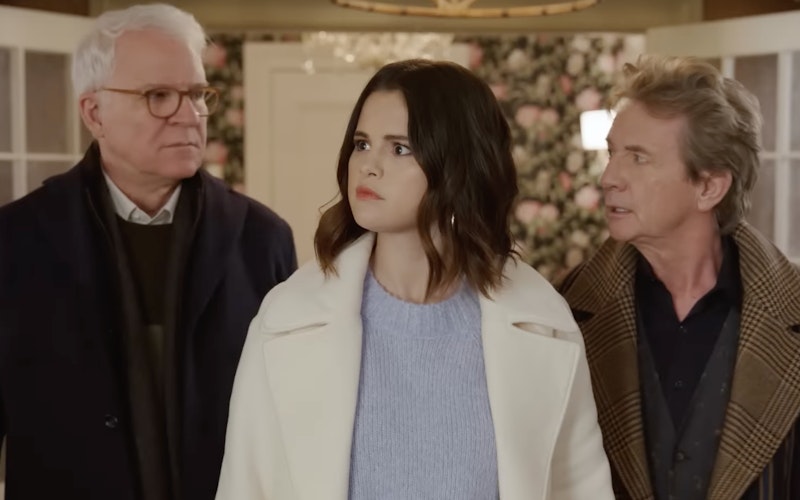
TV
The Heavenly Joy of Only Murders in the Building
When reflecting on a well-made mystery like Season 2 of Hulu’s Only Murders in the Building, most reviewers focus on the twists and turns. For me, however, the series offers more than a satisfying whodunit. Guided by the unique comic vision of series’ co-creator and co-star Steve Martin, Only Murders supplements the murder-mystery genre with delightful and unpredictable spasms of irrepressible joy—hysterical flashes that may indeed offer a glimpse of the kingdom of heaven.
One example occurs in Episode 4, when the intergenerational heroes of the series—Oliver (Martin Short), Charles (Steve Martin), and Mabel (Selena Gomez)—wait in anticipation for the opening of a bathroom door in Charles’ apartment. As they watch, Oliver, the flamboyant out-of-work theater director turned podcaster, gently reminisces: “You know, when I was a kid, and I was in the bathroom too long, my Grammy would knock on the door and say, ‘Oliver? Would you like me to come in there and rub some Vaseline on your rectum?’”
And just like that, I become 12-years-old again, riding waves of laughter that I cannot control and do not fully understand. The laughter reaches deep into my 53-year-old body and forces me to hit pause on the episode, lest I miss another disarmingly hilarious line. To be clear, this quip, expertly delivered by Short, in no way advances the plot nor is its meaning remotely clear. But, at least for me, the line (and a dozen others like it throughout the season) transcends such concerns.
The joyful mirth echoes similar fits of laughter that took place in my childhood basement over 40 years ago, when my best friend and I gleefully watched a young Steve Martin, along with a young Dan Ackroyd, play a pair of “wild and crazy guys” on reruns of Saturday Night Live. The joyful response mirrors Martin’s silly standup routines from the 1970s, which included his frenetic dancing as King Tut. My jubilant laughter follows similar outbursts spanning four decades of treasured non-sequiturs that pepper Martin’s best films, from The Jerk to Roxanne to L.A. Story to Bowfinger.
Only Murders supplements the murder-mystery genre with delightful and unpredictable spasms of irrepressible joy.
Christians often do not know what to do with comedy. C.S. Lewis’ playful description of how humor interacts with the soul, which can be found in The Screwtape Letters, might explain my response to Martin’s comic stylings. In Lewis’ epistolary novella, Wormwood, an apprentice demon, receives on-the-job training from his uncle, a senior devil named Screwtape. After observing that the human in his charge enjoys a good laugh, Wormwood inquires if demons can harness comedy to seduce humans toward sin. In response, Screwtape places humor onto a hierarchy of holiness. The highest form of humor is “joy,” described by Screwtape as “the facility with which the smallest witticisms produce laughter,” the cause of which is often unclear. According to Screwtape, “something like this [joy] occurs in Heaven—a meaningless acceleration in the rhythm of celestial experience, quite opaque to us.” Of course, the senior demon advises his trainee to steer humans away from such moments of incorruptible comic exuberance, stating, “Laughter of this kind does us no good and should always be discouraged.”
Admittedly, much of Martin’s comedy also fits into Lewis’ less-holy humor categories (fun, joke proper, and flippancy in descending order of holiness). Yet Martin often evokes Lewis’ description of joy in the way it elicits unexpected laughter. A philosophy major in college and professed agnostic, Martin knows his comedy is different. In his autobiography, Born Standing Up, he describes a breakthrough that revolutionized his approach. Having grown weary of traditional comic setups as a young comedian, he asked himself, “What if there were no punch lines? What if there were no indicators? What if I created tension and never realized it? What if I headed for a climax but all I delivered was an anticlimax?”
In Episode 8 of Season 2, another “anticlimax” occurs for me when a lonely and awkward neighbor, Howard (Michael Cyril Creighton), innocently professes his passion for the musical genre of “yodelshop.” Howard’s attraction to “a classic genre of barbershop harmonies punctuated by the ancient alpine art of distance yodeling” does nothing to reveal the identity of Season 2’s murderer, but oh my, the giggles that result—especially when the entire building collectively yodelshops Simon and Garfunkel’s “The Sound of Silence.” Moments like this lead viewers toward what Screwtape describes as “a meaningless acceleration in the rhythm of celestial experience. . .” Absurd silliness gifts us a glimpse of the inexplicable joy promised in the coming kingdom.
Both seasons of Only Murders in the Building offer viewers much to love. In addition to being a fine addition to the comedy-mystery subgenre, Curt Beech’s elegant production design and Siddhartha Khosla mood-evoking score elevate the series well above the standard fare. And the deep and genuine affection on display between old collaborators Martin and Short pulsates throughout the series like a love letter to friendship. But, at least for me, the most unique, odd, and wonderful feature of the show reveals itself in other ways. Once or twice during each episode, a loveable character utters a silly and abstract line that delightfully destroys my composure. It may well portend the joy of eternity.
Topics: TV